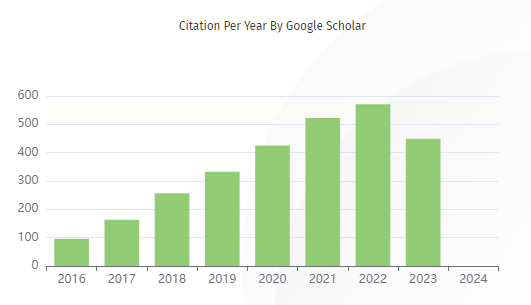Peran Dependency, Commitment, Trust dan Communication terhadap Kolaborasi Rantai Pasok dan Kinerja Perusahaan: Studi Pendahuluan
DOI:
https://doi.org/10.12695/jmt.2014.13.3.6Abstract
Abstrak. Kolaborasi rantai pasok memegang peranan penting dalam efektivitas organisasi. Penelitian pendahuluan ini bertujuan untuk mengidentifikasi faktor psikologi sosial yang dapat mempengaruhi hubungan kolaboratif dalam suatu rantai pasok, dalam konteks usaha pengolahan makanan skala menengah. Praktek kolaborasi rantai pasok dan dampak penerapannya terhadap kinerja perusahaan, baik operasional maupun finansial, juga ikut ditelaah. Berdasarkan tujuan ini, 'pendekatan survei dalam studi kasus' digunakan. Data dikumpulkan dari sebuah perusahaan pengolahan makanan skala menengah. Model partial least squares-path modeling diajukan untuk mengkonseptualisasi dan mengukur pengaruh dari ketergantungan, komitmen, kepercayaan dan komunikasi pada kolaborasi rantai pasok. Efek dari kolaborasi rantai pasok pada kinerja perusahaan juga diukur. Dengan menggunakan sudut pandang buyer, hasil penelitian mengungkapkan bahwa komitmen dan kepercayaan berpengaruh positif pada kolaborasi rantai pasok, dan kolaborasi rantai pasok memiliki pengaruh yang berarti pada kinerja perusahaan. Sementara itu, ketergantungan mempengaruhi kolaborasi secara tidak langsung melalui komitmen, dan komunikasi mempengaruhi kolaborasi secara tidak langsung melalui kepercayaan.
Kata kunci: Rantai pasok, Kolaborasi, Manufaktur, Partial least squares, Faktor psikologi sosial
Abstract. Supply Chain Collaboration plays a significant role to the effectiveness of organizations. This preliminary study aims to identify social psychology factors that might influence collaborative relationship within a supply chain network, in the context of medium-sized food manufacturing enterprise. The supply chain collaboration practice and its impact of implementation on firm's performance, both operational and financial, were investigated. Based on this purposes, a survey within a case study approach was conducted. The data were collected from one medium scale food manufacturing enterprise. A partial least squares-path modeling (PLS-PM) was proposed for conceptualizing and measuring the effects of dependence, commitment, trust, and communication on supply chain collaboration. The effect of supply chain collaboration on firm's performance was also measured and quantified. From buyer's perspective, the study reveals that commitment and trust positively affect supply chain collaboration and that supply chain collaboration has a considerable effect on firm's performance. Meanwhile, dependence influences the collaboration indirectly through commitment, while communication influences the collaboration indirectly through trust.
Keywords: Supply chain, Collaboration, Manufacturing, Partial least squares, Social psychology factors
Downloads
References
Anbanandam, R., Banwet, D. K. & Shankar, R. (2011). Evaluation of supply chain collaboration: a case of apparel retail industry in India. International Journal of Productivity and Performance Management, 60 (2), 82–98.
Babbie, Earl. (2013). The Practice of Social Research (13th Ed.). Belmont, CA: Wadsworth Cengeage Learning.
Badan Pusat Statistik. (2014). Berita Resmi Statistik: Pertumbuhan Ekonomi Indonesia (16/02/XVII). Indonesia: BPS.
Bagozzi, R. P., & Yi, Y. (1988). On the evaluation of structural equation models. Journal of the Academy of Marketing Science, 16(1), 74 – 94.
Cambra, J. J. & Polo, Y. (2011). Post-satisfaction factors affecting the long-term orientation of supply relationships. Journal of Business & Industrial Marketing, 26/6, 395 – 405.
Chen, I.J. & Paulraj, A. (2004). Towards a theory of supply chain management: the constructs and measurements. Journal of Operations Management, 22(2), 119 – 150.
Creswell, J. W. (2009). Research design: Qualitative, quantitative, and mixed methods approaches 3rd Ed. California: SAGE Publications.
Ferrer, M., Santa, R., Hyland, P. W. & Bretherthon, P. (2010). Relational factor that explain supply chain relationships. Asia Pacific Journal of Marketing and Logistics, 22(3), 419 – 440.
Fornell, C., & Larcker, D.F. (1981). Evaluating structural equation models with unobservable variables and measurement error. Journal of Marketing Research, 18(1), 39 – 50.
Frankel, R., Goldsby, T.J. & Whipple, J.M. (2002). Grocery industry collaboration in the wake of ECR. International Journal of Logistics Management, 13(1), 57 – 72.
Ganesan, S. (1994). Determinants of long term orientation in buyer-seller relationships. Journal of Marketing, 58(2), 1 – 19.
Hair, J. F., Ringle, C. M., & Sarstedt, M. (2011). PLS-SEM: Indeed a Silver Bullet. Journal of Marketing Theory and Practices, 19(2), 139 – 151.
Hanseler, J., Ringle, C. M. & Sarstedt, M. (2012). Using partial least squares path modelling in advertising research: basic concepts and recent issues. Handbook of Research on International Advertising: 252 – 276.
Hewstone, M., Schut, H., Wit, J.D., Bos, K.V. & Stroebe, M.S. (2007). The Scope of Social Psychology. New York: Psychology Press.
Kementerian Koperasi dan Usaha Kecil dan Menengah Republik Indonesia. Depkop. Hompage online. Avalailable from http://www.depkop.go.id/index.php?option=com_phocadownload &view=sections&Itemid=93; Internet; accessed 18 March 2014.
Kementerian Perindustrian Republik Indonesia. (2012). Direktori Industri Makanan, Hasil Laut dan Perikanan. Indonesia: BPS.
Kim, D., Kumar, V. & Kumar, U. (2010).Performance assessment framework for supply chain partnership. Supply Chain Management: An International Journal, 15(3), 187 – 195.
Kumar, G. & Banerjee, R.N. (2012). Collaboration in supply chain: An assessment of hierarchical model using partial least squares (PLS). International Journal of Productivity and Performance Management, 61(8), 897 – 918.
Kwon, I. & Suh, T. (2004). Factors affecting the level of trust and commitment in supply chain relationships. The Journal of Supply Chain Management, 40(2), 4 – 14.
Kwong, K & Wong, K. (2013). Partial Least Squares Structural Equation Modelling (PLS-SEM) Techniques Using SmartPLSâ€, Marketing Bulletin 24, Technical Note 1.
Malhotra, N. K. & Birks, D. F. (2006). Marketing Research: An Applied Approach 2nd European edition. London, England: Pearson Education.
Mamad, M. & Chahdi, F.O. (2013), “The Factors of the Collaboration between the Upstream Supply Chain Actors: Case of the Automotive Sector in Morocco. International Business Research, 6 (11), 15 – 28.
Mehrjerdi, Y. Z. (2009). The collaborative supply chainâ€, Assembly automation, 29(2), 127 – 136.
Min, S., Roath, A.S., Daugherty, P. J., Genchev, S. E., Chen, H., Arndt, A.D. & Richey, R.G. (2005. Supply chain collaboration: what's happening?. The International Journal of Logistics Management, 16 (2), 237 – 256.
Morgan, R. & Hunt, S. (1994). The commitment-trust theory of relationship marketingâ€, Journal of Marketing, 58(3), 20 – 38.
Papakiriakopoulos, D. & Pramatari, K. (2010). Collaborative performance measurement in supply chainâ€, Industrial Management & Data Systems 110(9), 1297 – 1318.
Patton, M. Q. (1990). Qualitative evaluation and research methods (2nd Ed.). Newbury Park, CA: Sage Publications.
Piriyakul, M. & Kerdpitak, C. (2011). Mediation Effects of Logistics Performance on Collaboration and Firm Performance of Palm Oil Companies: PLS Path Modelingâ€, Journal of Management and Sustainability, 1/1:90-98.
Ringle, C.M., Wende, S. & Will, S. (2007). SmartPLS 2.0 M3 Beta. University of Hamburg, Hamburg; http://www.smartpls.de
Ryu, I., So, S. & Koo, C. (2009). The role of partnership in supply chain performanceâ€, Industrial Management & Data Systems, 109(4), 496 –514.
Salam, M. A. (2011). Supply chain commitment and business process integrationâ€, European Journal of Marketing, 45(3), 358 – 382.
Simatupang T. M. & Sridharan, R. (2005). The collaboration index: a measure for supply chain collaborationâ€, International Journal of Physical Distribution & Logistics Management, 35(1), 44 – 62.
Singarimbun, M. & Effendi, S. (2011). Metode Penelitian Survei: Edisi Revisi. Jakarta: LP3ES.
Singh, P. J. & Power D. (2009). The nature and effectiveness of collaboration between firms, their customers and suppliers: a supply chain perspective. Supply Chain Management: An International Journal, 14/3, 189 – 200.
Sridharan, R. & Simatupang T. M. (2013). Power and trust in supply chain collaboration. Int. J. of Value Chain Management, 7(1), 76 – 96.
Sunardi, O. & Tjakraatmadja, J. H. (2013). Enablers to Knowledge Management Implementation in Indonesian Medium-sized Manufacturing Enterprises: A Preliminary Study. Proceeding on the 12th International DSI and the 18th Asia Pacific DSI Conference [unpublished].
Tambunan, T. (2012). Pasar Bebas ASEAN: Peluang, Tantangan dan Ancaman bagi UMKM Indonesia. Infokop 21, 13 – 35.
Tenenhaus, M., Vinzi, V. E., Chatelin, Y. & Lauro, C. (2005). PLS path modelling. Computational Statistics & Data Analysis, 48, 159 – 205.
Vereecke, A. & Muylle, S. (2006). Performance improvement through supply chain collaboration in Europe. International Journal of Operations & Production Management, 26(11), 1176 – 1198.
Vinzi, V. E., Chin, W. W., Hanseler, J. & Wang, H. (2010). Handbook of Partial Least Squares: Concepts, Methods and Applications. Berlin: Springer.
Wu, M., Weng, Y. & Huang, I. (2012). A study of supply chain partnership based on commitment-trust theory. Asia Pacific Journal of Marketing and Logistics, 24(4), 690 – 707.
Yin, R. K. (2009). Case study research: Design and methods (4th edition). California: SAGE Publications.
Zhang, M. & Huo, B. (2012),. The impact of dependence and trust on supply chain integrationâ€, International Journal of Physical Distribution & Logistics Management, 43(7), 544 – 563.
Downloads
Submitted
Accepted
Published
How to Cite
Issue
Section
License

This work is licensed under a Creative Commons Attribution-NonCommercial-ShareAlike 4.0 International License. Copyright @2023. This is an open-access article distributed under the terms of the Creative Commons Attribution-NonCommercial-ShareAlike 4.0 International License (http://creativecommons.org/licenses/by-nc-sa/4.0/) which permits unrestricted non-commercial used, distribution and reproduction in any medium.

















